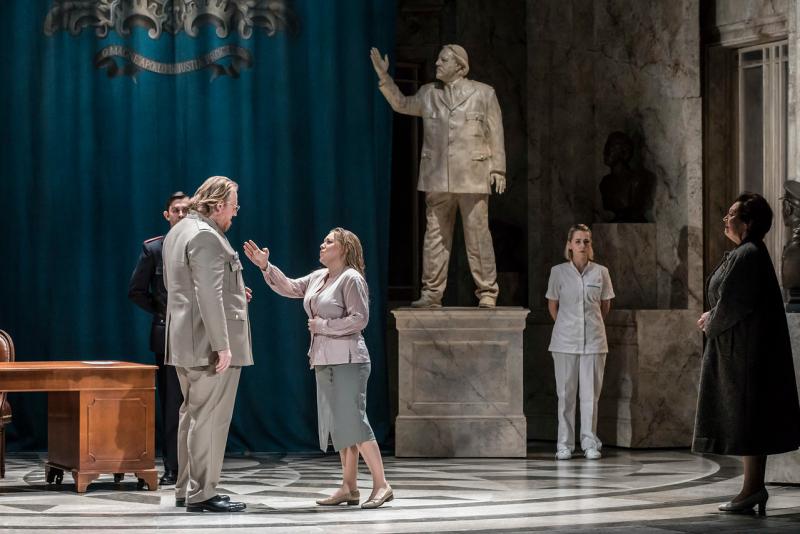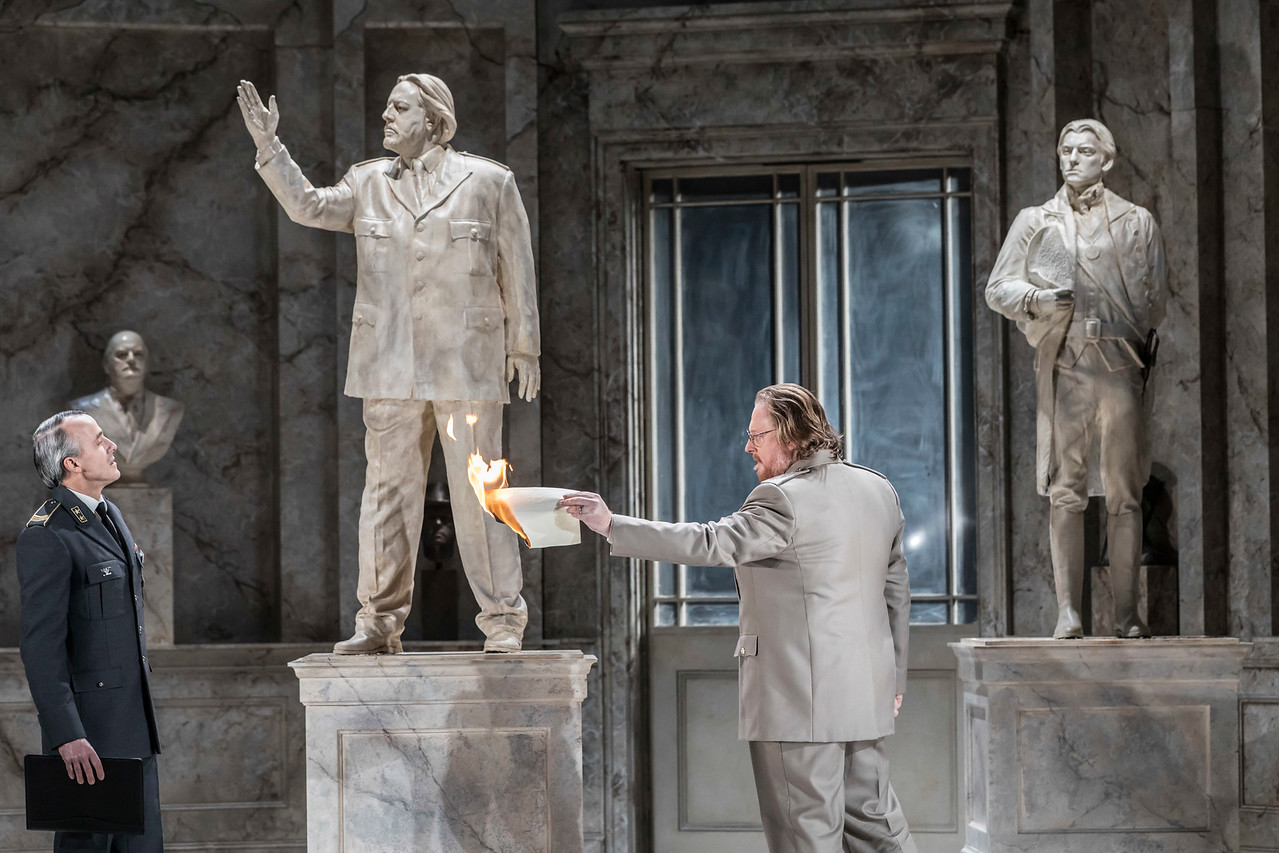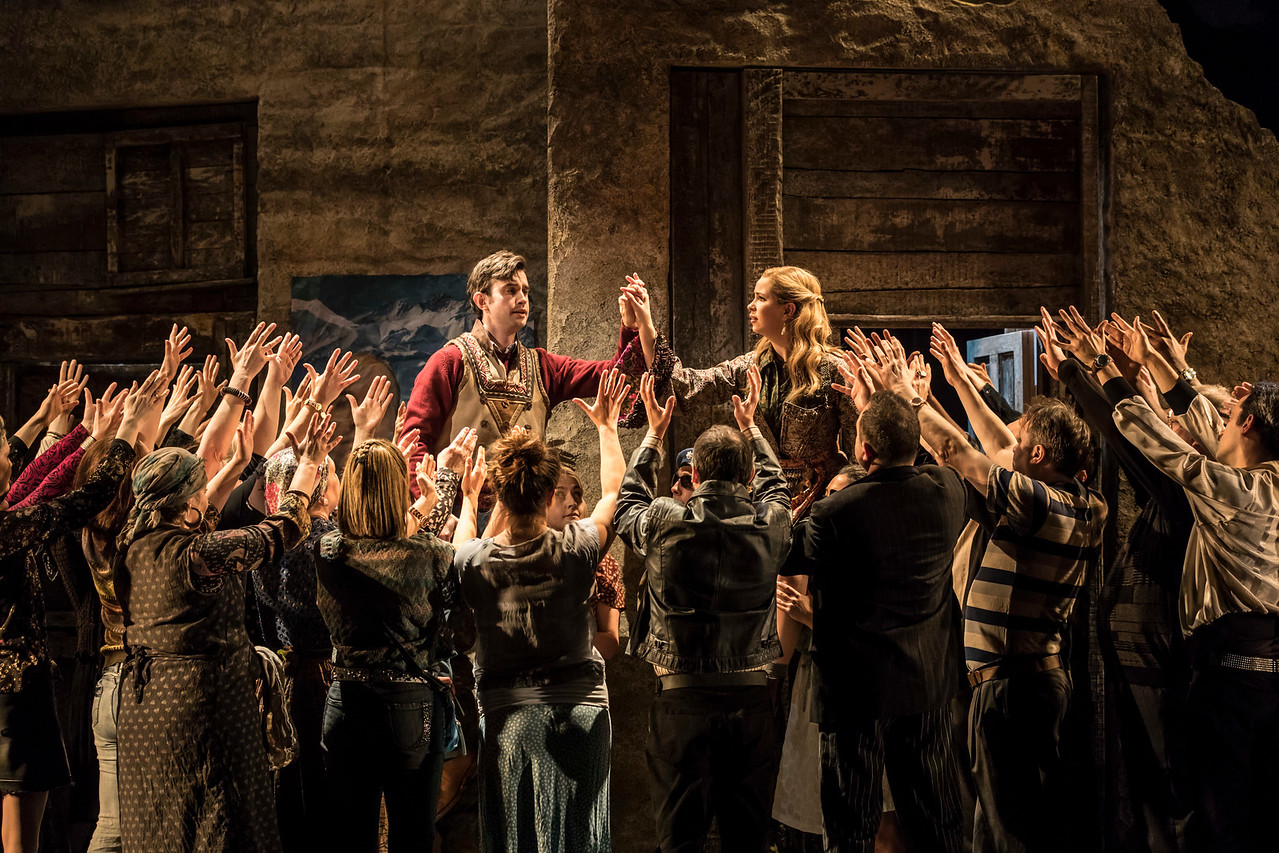The Winter's Tale, English National Opera | reviews, news & interviews
The Winter's Tale, English National Opera
The Winter's Tale, English National Opera
Concentrated if limited new Shakespeare opera elevated by cast and direction

After a Royal Opera performance of Birtwistle's The Minotaur, a friend spotted Hans Werner Henze in the foyer and had the temerity to ask that annoying question "What did you think?" "Very competent and extremely well performed," came the reply.
Clarity is a quality, too, of Wigglesworth's score. His libretto, certainly, is a masterly job of Shakespearean compression, some 20 pages of text telescoping many sentiments but keeping some of the most poetically hard-hitting lines as we move from the harsh, wintry kingdom of Leontes to the spring fairy-tale of Polixenes's Bohemia 16 years later and back to reckoning and recognition. But always beware a composer who talks of "taking on a sound-world". Timbre and colour are vital components, of course, but when they're foregrounded at the expense of variety in musical and harmonic language or careful dramatic delineation of various characters, the result is bound to be limited. This is a parallel if not aurally similar world to George Benjamin's hugely over-rated Written on Skin, fascinating in its instrumental colour but low on dramatic pace (though in this case at least the structure is dictated by Shakespeare). Wigglesworth the Second - as we have to call him now that his namesake Mark Wigglesworth has left the ENO's Oval Office, though Ryan's conducting seems to have come on since I last heard him and lends conviction to agony - is hampered by his post-Berg-and-Mahler narrowness (and those two composers were always dramatically various and sure-footed, of course, in opera and symphony). One descending figure - think Wozzeck's "Ah, Marie!" - is all you'll take away from Act One: when the stakes are angsty from the start, and remain so for Hermione's brief nursery idyll with Paulina and Mamiilius, there's nowhere for Leontes' motiveless jealousy to go. Iain Paterson (pictured above with Timothy Robinson, left, as Camillo) conveys it with marvellous economy and bleakness, but the vocal lines, as in Adès, are unrewarding. There's some half-effective stuff for the chorus, shouting justice for the maligned Hermione and results from Apollo's oracle, but the orchestral interludes are unvaried in their tortuousness.
Wigglesworth the Second - as we have to call him now that his namesake Mark Wigglesworth has left the ENO's Oval Office, though Ryan's conducting seems to have come on since I last heard him and lends conviction to agony - is hampered by his post-Berg-and-Mahler narrowness (and those two composers were always dramatically various and sure-footed, of course, in opera and symphony). One descending figure - think Wozzeck's "Ah, Marie!" - is all you'll take away from Act One: when the stakes are angsty from the start, and remain so for Hermione's brief nursery idyll with Paulina and Mamiilius, there's nowhere for Leontes' motiveless jealousy to go. Iain Paterson (pictured above with Timothy Robinson, left, as Camillo) conveys it with marvellous economy and bleakness, but the vocal lines, as in Adès, are unrewarding. There's some half-effective stuff for the chorus, shouting justice for the maligned Hermione and results from Apollo's oracle, but the orchestral interludes are unvaried in their tortuousness.
The real test was going to be whether Wigglesworth could conjure a different world for Hermione's and Leontes's teenage daughter as Bohemian shepherdess and her wooing by a disguised Prince Florizel. He doesn't, in terms of musical language, even if the sounds are more ethereal. Samantha Price and Anthony Gregory (pictured below with the ENO Chorus) charm with very limited material; I suppose it's a mercy we don't get a "hey nonny nonny" divertissement, but this is where a popular, mood-sensitive composer like Joby Talbot, in his music for the Royal Ballet's fitfully very effective take on The Winter's Tale, can give us all the relief we need. Once again, when Polixenes' spoken explosion at his son's behaviour arrives - and it's vehemently delivered by the ever committed Leigh Melrose - it has no real contrasts to fight against. Back in "Sicilia", Wigglesworth does capture the glacial strangeness of the crucial Hermione-as-statue scene; Susan Bickley as Paulina at last gets a chance to exercise her formidable presence and authority, while Sophie Bevan's high-line act - again, under-engaged in Act One - caps the miracle. Where Wigglesworth excels is in stripping down orchestral textures so that one or two solo instruments or two - clarinets, a double-bass with Leontes, a ravishing flute solo - focus the magic, But the denouement would have been so much more effective if it came out of contrasts.
Back in "Sicilia", Wigglesworth does capture the glacial strangeness of the crucial Hermione-as-statue scene; Susan Bickley as Paulina at last gets a chance to exercise her formidable presence and authority, while Sophie Bevan's high-line act - again, under-engaged in Act One - caps the miracle. Where Wigglesworth excels is in stripping down orchestral textures so that one or two solo instruments or two - clarinets, a double-bass with Leontes, a ravishing flute solo - focus the magic, But the denouement would have been so much more effective if it came out of contrasts.
That said, Kinnear - whose programme article is much more flavoursome than Wigglesworth's - never puts a foot wrong, and if his Bohemian scene, over-compressed in the opera, doesn't go wild on vernal contrast, that's in keeping with the same-y musical style. Leontes is a bemedalled dictator in a neoclassical hall of statues - that keeps the Apollo references and the mythmaking pertinent - while Polixenes seems bent on similar autocracy over the seas. Kinnear doesn't labour the point he makes in the programme about "a capricious ruler, easily provoked, fatally proud, appalling in his treatment of women, ignorant of the natural world, quick to throw up barriers between his own and a neighbouring country", but the thought does enter our heads.
Kinnear is wrong about one thing in that note: there is another "major operatic version" of The Winter's Tale, Philippe Boesmans', preserved in a fine recording from Brussels' La Monnaie conducted by Antonio Pappano. A worthier candidate for his attentions, perhaps; but that said, this will certainly merit at least one revival by virtue of its fine team and a story simply if monotonously told. Next, though, let Kinnear loose on the other Shakespearean romances for which he declares his special love: this is one actor who really does have the objectivity and the style to be a top director.
rating
Explore topics
Share this article
Add comment
The future of Arts Journalism
You can stop theartsdesk.com closing!
We urgently need financing to survive. Our fundraising drive has thus far raised £49,000 but we need to reach £100,000 or we will be forced to close. Please contribute here: https://gofund.me/c3f6033d
And if you can forward this information to anyone who might assist, we’d be grateful.

Subscribe to theartsdesk.com
Thank you for continuing to read our work on theartsdesk.com. For unlimited access to every article in its entirety, including our archive of more than 15,000 pieces, we're asking for £5 per month or £40 per year. We feel it's a very good deal, and hope you do too.
To take a subscription now simply click here.
And if you're looking for that extra gift for a friend or family member, why not treat them to a theartsdesk.com gift subscription?
more Opera
 Albert Herring, English National Opera review - a great comedy with depths fully realised
Britten’s delight was never made for the Coliseum, but it works on its first outing there
Albert Herring, English National Opera review - a great comedy with depths fully realised
Britten’s delight was never made for the Coliseum, but it works on its first outing there
 Carmen, English National Opera review - not quite dangerous
Hopes for Niamh O’Sullivan only partly fulfilled, though much good singing throughout
Carmen, English National Opera review - not quite dangerous
Hopes for Niamh O’Sullivan only partly fulfilled, though much good singing throughout
 Giustino, Linbury Theatre review - a stylish account of a slight opera
Gods, mortals and monsters do battle in Handel's charming drama
Giustino, Linbury Theatre review - a stylish account of a slight opera
Gods, mortals and monsters do battle in Handel's charming drama
 Susanna, Opera North review - hybrid staging of a Handel oratorio
Dance and signing complement outstanding singing in a story of virtue rewarded
Susanna, Opera North review - hybrid staging of a Handel oratorio
Dance and signing complement outstanding singing in a story of virtue rewarded
 Ariodante, Opéra Garnier, Paris review - a blast of Baroque beauty
A near-perfect night at the opera
Ariodante, Opéra Garnier, Paris review - a blast of Baroque beauty
A near-perfect night at the opera
 Cinderella/La Cenerentola, English National Opera review - the truth behind the tinsel
Appealing performances cut through hyperactive stagecraft
Cinderella/La Cenerentola, English National Opera review - the truth behind the tinsel
Appealing performances cut through hyperactive stagecraft
 Tosca, Royal Opera review - Ailyn Pérez steps in as the most vivid of divas
Jakub Hrůša’s multicoloured Puccini last night found a soprano to match
Tosca, Royal Opera review - Ailyn Pérez steps in as the most vivid of divas
Jakub Hrůša’s multicoloured Puccini last night found a soprano to match
 Tosca, Welsh National Opera review - a great company reduced to brilliance
The old warhorse made special by the basics
Tosca, Welsh National Opera review - a great company reduced to brilliance
The old warhorse made special by the basics
 BBC Proms: The Marriage of Figaro, Glyndebourne Festival review - merriment and menace
Strong Proms transfer for a robust and affecting show
BBC Proms: The Marriage of Figaro, Glyndebourne Festival review - merriment and menace
Strong Proms transfer for a robust and affecting show
 BBC Proms: Suor Angelica, LSO, Pappano review - earthly passion, heavenly grief
A Sister to remember blesses Puccini's convent tragedy
BBC Proms: Suor Angelica, LSO, Pappano review - earthly passion, heavenly grief
A Sister to remember blesses Puccini's convent tragedy
 Orpheus and Eurydice, Opera Queensland/SCO, Edinburgh International Festival 2025 review - dazzling, but distracting
Eye-popping acrobatics don’t always assist in Gluck’s quest for operatic truth
Orpheus and Eurydice, Opera Queensland/SCO, Edinburgh International Festival 2025 review - dazzling, but distracting
Eye-popping acrobatics don’t always assist in Gluck’s quest for operatic truth
 MARS, Irish National Opera review - silly space oddity with fun stretches
Cast, orchestra and production give Jennifer Walshe’s bold collage their all
MARS, Irish National Opera review - silly space oddity with fun stretches
Cast, orchestra and production give Jennifer Walshe’s bold collage their all

Comments
What a completely wrong
Respectfully, David has
Respect is not a word I
Well, I changed my mind, didn
Well, I changed my mind, didn't I, about the conducting at least. And I respected the hard work from all concerned. The rest isn't worth dignifying with a response, though I see there's some score-settling going on - that remark wasn't nice, though you ignore all the praise - and you certainly got your own back with 'worse than a joke'.
As for the other negative commenter below, I would be happy to know what his own 'profound understanding' might be, so that those of us who are too stupid might see the light. Seriously, it's better to answer with a defence rather than insults. And talking about how those involved loved it is no real argument for the end product.
Now I suggest you move on to others who either shared my views or really didn't like what they saw at all.
Thankfully I am not paid to
Respect in commenting means
Respect in commenting means not just pouring scorn but arguing your contrary view, which in my opinion, and - more eloquently expressed - Mark Valencia's below is all that's being requested from you. It seems I ask in vain, so I will, more respectfully than you in your first comment, beg to differ and part company.
Completely agree - DN's
I too was at this fine world
I too was at this fine world premiere and enjoyed lots of things about it as did David Nice in his extremely fair review. He did after all give the performance four stars. The singers were in fine vocal form but perhaps struggled to find real singing material to work with. Also there could have been more emotional variety for them to build on but the dedication and work which had gone into making this opera happen could only be admired. When I read David's piece, I found echoes of these thoughts in his review and remembering my own quickfire reaction to some reviews in my day, one perhaps has to take a little time to read and consider before reacting. David is no fool and has vast experience of performances and so perhaps we can learn from or at least think about his erudite comments rather than dismissing them out of hand.
Since I almost always agree
A healthy debate would be so
The tenor is an ass on this
I don't know the Boesmans,